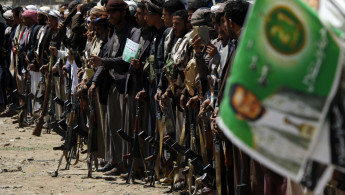Sudan was bribed to fight in Yemen, but after Bashir it may be finally withdrawing
Earlier this month, online footage showing Sudanese soldiers captured by Yemen’s Houthi fighters went viral. But this was only the most recent incident highlighting the extent of Sudan's losses on the battleground in Yemen, a few years after Khartoum was bribed to join the Saudi-led Arab coalition fighting Iran-backed rebels there.
There is no exact official tally of Sudanese troop deployment in Yemen, but some reports estimate 40,000 Sudanese soldiers have been sent to fight in the war-torn nation since 2015, although other reports put the number at the much smaller figure of 8,000 to 14,000 soldiers.
Reports also put the Sudanese death toll in Yemen in the thousands over the last five years, but Khartoum does not release official figures. According to Houthi rebel spokesperson Yahia Saree, over 4,000 Sundanese soldiers have been killed in the war since 2015 but the New Arab cannot verify this number.
At a press conference in Sanaa, Saree urged the people of Sudan to pressure their new government to end their country's involvement with the Saudi-led coalition and withdraw from Yemen.
Houthis claim 459 soldiers have been killed since the start of 2019 alone. Such a number may not be precise but the painful toll on the part of Sudan's battalions in Yemen is undeniable.
Yemen has been historically known as the grave of invaders and the thousands of Sudanese fighters there are not an exception.
The motives of Sudan's involvement in Yemen
In March 2015, Sudan joined the Saudi-led Arab coalition to help roll back the Houthi takeover of Yemen's north and restore the internationally recognised government of Yemen.
The Houthis at the time ousted the Saudi-backed Yemeni government and they emerged as a new force viewed as an Iranian proxy in Yemen.
Believed to be tough fighters in rugged territories, Sudanese soldiers including from the notorious Rapid Support Forces that wreaked havoc in Darfur, were deployed in several areas of Yemen including the Yemen-Saudi border, the western coast of Yemen, Hajja province, Mocha and Aden.
Since the start of the war, Sudan has been justifying its military involvement in Yemen by saying its mission is to help contain Iranian expansion in the region, echoing Saudi Arabia’s narrative. Sudan's ousted president Omar al-Bashir even said that "Sudan’s declared principle is to defend the land of the two holy mosques", in reference to the kingdom.
While Sudan has used such religious rhetoric to justify its military involvement in Yemen war, its financial motives are a more likely explanation.
Sudanese soldiers on the ground are risking their lives, yet many who return unharmed are likely to be rewarded handsomely. At the national level, Sudan’s sacrifices in Yemen’s war please Saudi Arabia and that is a guarantee for generous assistance from Riyadh to Khartoum.
Indeed, deposed president Omar al-Bashir has received millions of dollars outside of Sudan’s state budget since the beginning of his country's participation in the military campaign in Yemen. Bashir himself confessed during a corruption trial in August this year to receiving $90 million from Saudi Crown Prince Mohammed bin Salman.
Has the withdrawal begun?
Prior to the downfall of Bahir, cash-strapped Sudan did not contemplate withdrawing its from Yemen. But now that Bashir is behind bars and a new political leadership has emerged in the country, Sudan is no longer under the grip of the military regime, and this could pave the way for a fresh strategy to deal with Yemen’s conflict.
Two senior Sundanese officials were quoted last week as saying Sudan has recently reduced its forces fighting under the Saudi-led coalition in Yemen. They said "several thousand troops," mainly from the Rapid Support Forces, came back home over the last two months. The Sudanese forces remaining in Yemen will assist in training the Yemeni government forces, they further claimed.
This declaration of a Sudanese drawdown in Yemen could be the start of the gradual retreat of Sudanese military personnel from the impoverished Arab country across the Red Sea. The pressure exerted by the public in Sudan has been mounting, pushing the current leadersto revisit their country’s involvement in Yemen's war.
New leaders in Sudan's political arena coupled with the people’s calls for ending the military involvement in Yemen’s war could now push to stop Sudanese forces from being deployed in Yemen even in exchange for millions of dollars from Saudi Arabia.
Taj Al-Sir Othman, a Sudanese thinker and writer, said the withdrawal of Sudanese forces is a national demand and their engagement in Yemen’s war should be stopped.
Meanwhile, the Arab coalition has disintegrated over the last five years. In addition to the UAE and Saudi Arabia themselves, coalition members such as Sudan have begun to realize their miscalculations in Yemen and their inability to win the war.
"They [Saudis] can mobilise ground forces, but they do not want their youths to fall on the battlefield and see mourning in every house home," tweeted Othman, the Sudanese intellectual.
"So, what is the solution? They bring youths from Sudan and they find no problem in seeing mourning in every Sudanese house".
Follow us Twitter and Instagram to stay connected



